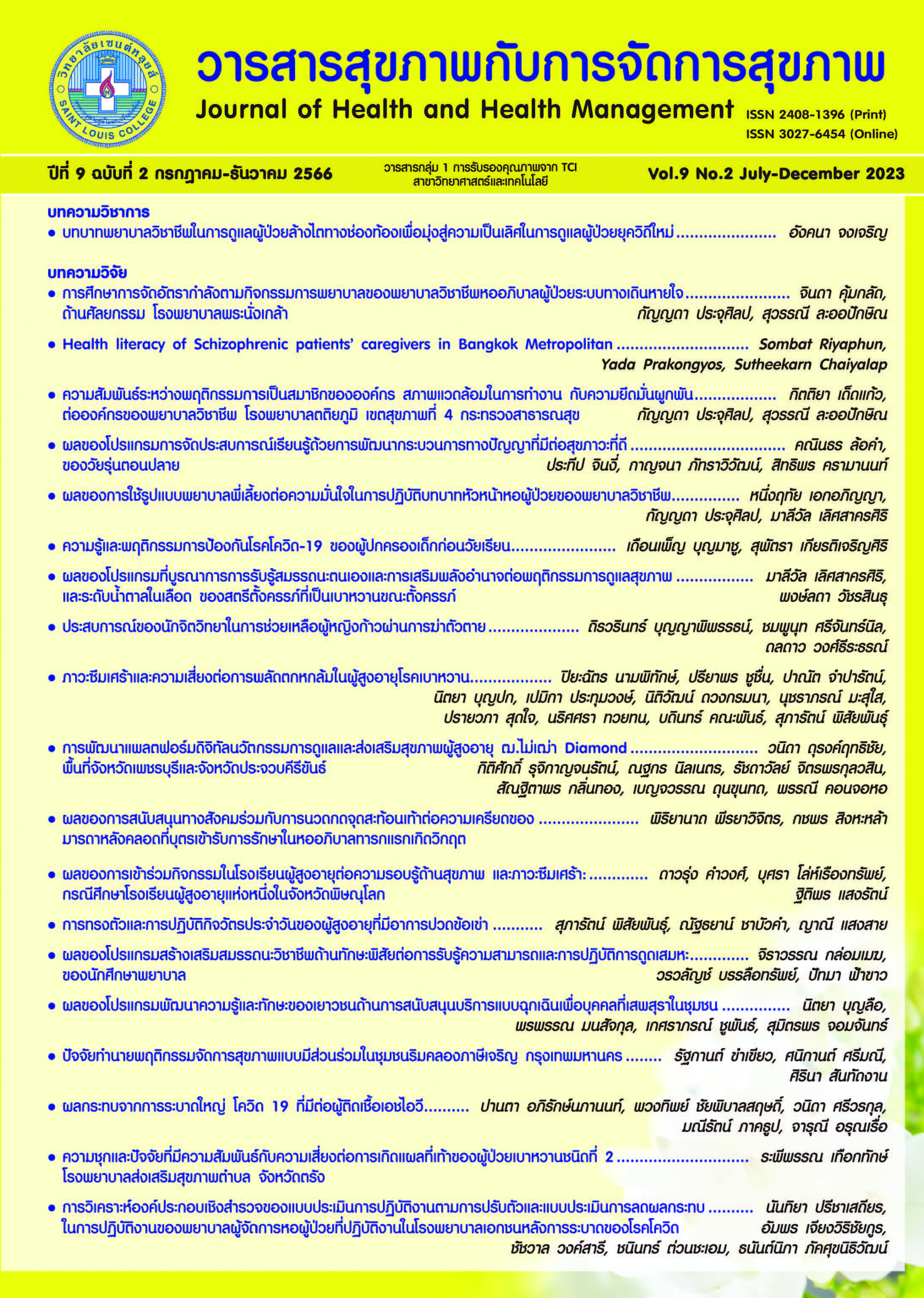Effect of Entrustable Professional Activity Promoting Program on Self- Efficacy and Suction of Secretion Procedure of Nursing Students
Keywords:
entrustable professional activity promoting program, perceived Self- Efficacy in suction of secretion and suction of secretion procedure, student nurseAbstract
The purpose of this quasi-experimental research was to study the effects of the entrust-able professional activity (EPA) strengthening program on self-efficacy and to provide practice with the secretion suctioning procedure through nasal and cavity in young children for nursing students. Data collection was performed at the Pediatric Respiratory Ward of the Queen Sirikit National Institute of Child Health. The participants were purposively recruited from 60 nursing students studying in their third year at the Mission Faculty of Nursing, and they were separated into two groups of 30 students each by equalized averaged grades. The intervention assigned to the experimental group consisted of three steps applied in the following sequence: 1) students observed, no practice assigned, 2) students practiced under close supervision of the instructors, and 3) students practiced under distance supervision of the instructors. The students in the control group only practiced under the supervision of the instructors. Data were collected at the end of the practicum using the self-efficacy of secretion suctioning procedure in young children questionnaire, and practicing of suctioning procedure in young children evaluation, IOC = .67 - 1 and reliability index = .95. Statistics used for analysis of data were descriptive statistics and t-test. The results were: the average scores of self-efficacy and practice of secretion suctioning procedure for students in the experimental group were higher after attending the intervention than they were before, and were significantly higher than the scores for students in the control group (p < .05).
References
กัลยพัทธ์ นิยมวิทย์ และสุภา คำมะฤทธิ์ (2562). การพยาบาลเพื่อลดการคั่งค้างของเสมหะในผู้ป่วยเด็ก. วารสารวิทยาลัยพยาบาลพระปกเกล้า จันทบุรี, 30(1), 216-225.
กลุ่มวิชาการพยาบาลเด็กและวัยรุ่น คณะพยาบาลศาสตร์มิชชั่น. (2563). เกณฑ์การให้คะแนน Rubric score เรื่อง การเคาะทรวงอก และดูดเสมหะด้วยเครื่องดูดเสมหะทางจมูกและปากในเด็กเล็ก. กรุงเทพฯ: มหาวิทยาลัยนานาชาติเอเชีย-แปซิฟิก.
ชลธิชา ชลสวัสดิ์, สุลี ทองวิเชียร, และกรองแก้ว มีนวล. (2564). สมรรถนะวิชาชีพด้านทักษะพิสัยของนักศึกษาพยาบาลชั้นปีที่ 4 ในมหาวิทยาลัยเอกชนแห่งหนึ่ง. วารสารพยาบาล, 70(4), 11-19.
ธีรพันธ์ เชิญรัมย์. (2563). องค์การแห่งการเรียนรู้: การเรียนรู้จากการปฏิบัติ. วารสารวิจัยวิชาการ, 3(1), 185-196.
พิชญ์สินี มงคลศิริ, จุรีรัตน์ กิจสมพร, สตรีรัตน์ ธาดากานต์, สุลี ทองวิเชียร, สร้อย อนุสรณ์ธีรกุล, วัชรี อมรโรจน์วรวุฒิ, และชนม์นิภา ใจดี. (2564). การกำหนดระดับความไว้วางใจให้ปฏิบัติกิจกรรมพยาบาลวิชาชีพในหลักสูตรพยาบาลศาสตรบัณฑิต: การศึกษาเบื้องต้นในประเทศไทย. วารสารพยาบาลกระทรวงสาธารณสุข, 31(1), 161-176.
วิมลพรรณ สังข์สกุลการ. (2565). การพยาบาลผู้ป่วยเด็กระบบทางเดินหายใจ. กรุงเทพฯ: ธนาเพลส.
สตรีรัตน์ ธาดากานต์ และสุมลชาติ ดวงบุบผา. (2563). กิจกรรมในขอบเขตวิชาชีพด้านทักษะพิสัยที่เชื่อมั่นได้ในบัณฑิตพยาบาลและผดุงครรภ์จบใหม่ : การศึกษาแบบเดลฟาย. รามาธิบดีพยาบาลสาร, 26(2), 246-262.
สภาการพยาบาล. (2564). หลักสูตรพยาบาลศาสตรบัณฑิต หลักสูตรต้นแบบ สภาการพยาบาล พ.ศ. 2564. นนทบุรี: สภาการพยาบาล.
อมรพันธ์ สิงหพล. (2564). ผลการใช้ MU Sucker ระบายเสมหะในผู้ป่วยเด็กเล็กต่อการบาดเจ็บและความพึงพอใจของผู้ดูแล. วารสารกรมการแพทย์, 46(1), 237-242.
Al-Moteri, M. (2020). Entrustable professional activities in nursing: A concept analysis. International Journal of Nursing Sciences, 7(3), 277-284.
Downloads
Published
How to Cite
Issue
Section
License
Copyright (c) 2023 Journal of health and health management

This work is licensed under a Creative Commons Attribution-NonCommercial-NoDerivatives 4.0 International License.




